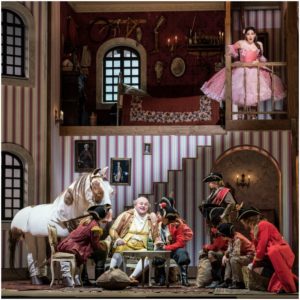
Dutch National Opera 2018-19 Review: Il Barbiere Di Siviglia
Nino Machaidze’s Rosina the Centerpiece in Lavish ‘Barber’
By Santosh VenkataramanAn audience favorite for the ages, Gioachino Rossini’s “Il Barbiere di Siviglia” has seen numerous iterations over the years. The young Dutch director Lotte de Beer’s new production at Dutch National Opera is a French Revolution-themed affair that focuses on the female perspective via Rosina.
In the beginning, we see the young Rosina denied a cupcake by Doctor Bartolo in foreshadowing of how they will be at odds. Throughout it all, she is clad in an exaggerated pink ballerina costume that symbolizes how she is objectified by the others throughout the opera.
Within this staging, it is simply not a matter of a pliant Rosina pining for her true love and drawing laughs in return. She also bares her fangs in a star portrayal by Nino Machaidze.
Star Turns
From the moment she rose from her bed in the “dollhouse” that served as the home of Bartolo to deliver her “Una voce poco fa,” Machaidze was a fireball of a Rosina. Her comedic touches were sharp as opposed to sweet and there was an anger to her weariness of being in a situation in which she has little control.
The soprano showcased an effortless coloratura and her tone was perfectly placed throughout the performance. Of particular note was her excellent stage chemistry with a colleague she is very familiar with in Misha Kiria’s Bartolo; both are from Georgia and came through the ranks at the Tbilisi State Conservatory.
Kiria was a particularly comic Bartolo with a larger than life presence that made him a fitting caricature for the role. The baritone’s “A un dottor della mia sorte” in Act one was rich in tone and hilarious to watch as his jealousy unfolded.
His rage grew when Count Almaviva entered as the soldier to be quartered in a particularly memorable scene that included a ridiculously comic “horse” that was actually two people in costume. The horse provided one of the better sight gags with a human hand coming out from under it on numerous occasions to hand Almaviva a letter.
Davide Luciano has performed his Figaro in a multitude of houses and it’s clear he has a comfort and familiarity with the barber. Luciano had the strongest voice of this group and he sounded sturdy throughout.
Last among the major principals was tenor Rene Barbera, who may have possessed the most beautiful voice of them all with a coloratura to rival that of Machaidze in his Count Almaviva. Barbera has enjoyed a number of debuts since relocating to Europe and his Dutch National Opera debut was a resounding success.
The Texan eased his way through much of Rossini’s difficult music, although his lighter sound was not helped at times by an overexuberant orchestra and this production does not contain the Count’s “Cessa di piu resistere.” Barbera’s Count was less of a heroic figure and more buffoon-like in proving to be a perfect foil to this Rosina-centered production.
The bass-baritone Marko Mimica brought bemusement as Basilio while studio artist and soprano Julietta Aleksanyan turned in a moving “Il vecchiotto cerca moglie” in her Berta.
Color Abounds In a Trapped Space
The vision of de Beer was complemented by outstanding sets and costumes by British designer Julian Crouch. The clever opening scene that featured a child as Rosina and dancing cupcakes brought out plenty of laughs.
An imaginative hot air balloon was where the Count’s “Ecco ridente” took place. That gave way to the dollhouse as Bartolo’s home that related less to the doctor and more to Rosina’s predicament of being trapped in a colorful but unsatisfactory world.
While the opera buffa was unfolding, there were also signs of the political backdrop with beggars on the street and other signs of the revolution in a welcome nod to the idea that there are truths to be gleaned even within comedy.
Conductor Maurizio Benini also made his debut at Dutch National Opera and did not have the simplest of tasks in merging the intricacies of the staging with the Netherlands Chamber Orchestra. It was an endeavor that was the least satisfactory of all of the elements of this performance.
It is always refreshing to see a fresh take on an old standby. De Beer’s ability to create a mood was first seen by international audiences in her Munich production of “Il Trittico” last season and her “Barber of Seville” is of a similar quality and tremendously entertaining.


